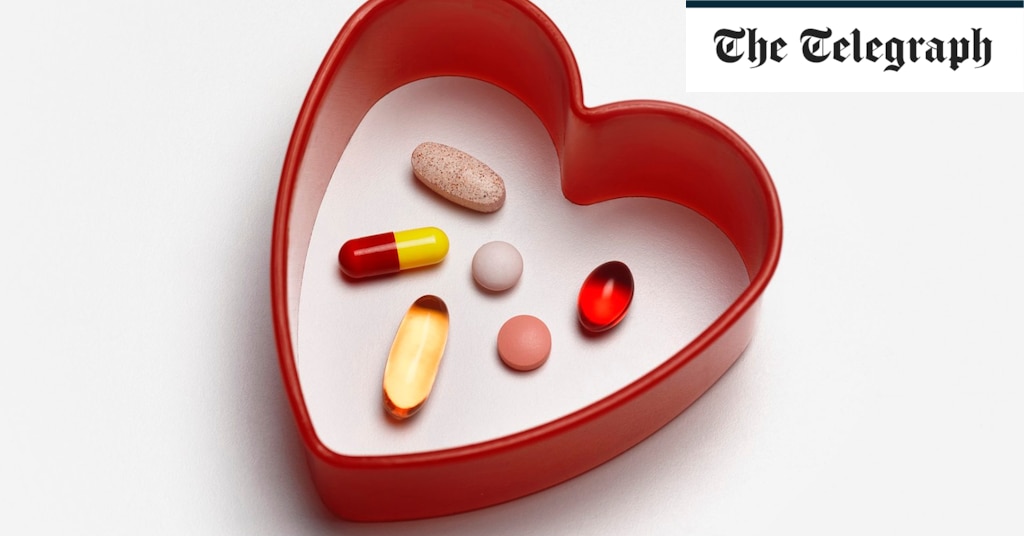If you’ve ever been jostled out of bed by violent leg cramps, noticed eye twitching, or poor sleep—all signs of a deficiency—it may be time to get your magnesium levels checked.
Women need about 270 mg a day, while adult men need 300 mg, according to UK guidelines. It is best to get magnesium quotas through the diet, as the body more easily absorbs minerals and vitamins from food. So sprinkle toasted almonds (270mg, per 100g) over your cereal, toss spinach (112mg) into stir-fries and stews and add quinoa (64mg) to salads; they are among the richest sources.
“While it’s important to eat whole foods to get magnesium, most people need to take about 150 to 300 mg of magnesium as a supplement to reach the recommended daily intake,” says Dr. DiNicolantonio. Magnesium glycinate and magnesium malate are the types that are best absorbed by the body, he adds.
Omega-3
While too much fat tends to clog our arteries and is terrible for our heart health, omega-3 fatty acids are a special type of fat, known as essential fatty acids, that our bodies need to function properly.
Many studies have shown that they reduce the risk of heart disease.
“Omega-3s are important for heart health because they have been shown to lower triglycerides (a type of fat in the blood), lower blood pressure and reduce the incidence of death and sudden cardiac death after a heart attack,” says Dr DiNicolantonio.
The most important types of omega-3 are alpha-linolenic acid (ALA), found in nuts and seeds, as well as eicosapentaenoic acid (EPA) and docosahexaenoic acid (DHA), which are mostly found in fatty fish but also found in white. fish and other seafood.
Salmon and sardines are the best sources of omega-3, but most people do not consume enough. “Almost everyone would benefit from taking 500 to 1,000 mg of EPA or DHA per day from some source,” says Dr DiNicolantonio. Studies show that 850 to 1,000 mg can have a protective effect, although a 250 mg dose may still have some benefits, he says.
There are no official UK guidelines on how much omega-3 we need, but the Dietary Guidelines recommend eating two 140g portions of fish a week, at least one of which is fatty.
Coenzyme Q10
Coenzyme Q10 (CoQ10) is an antioxidant found throughout the body. It fights free radicals (particles that damage cells, damage DNA and promote aging).
“CoQ10 is usually recommended for those on statins or who have heart failure,” says Dr DiNicolantonio. It’s thought to help these patients by improving left ventricular ejection fraction (the volume of oxygen-rich blood pumped out of the left side of the heart each time it contracts), he explains.
A review written by Dr DiNicolantonio highlighted a study which found that CoQ10 supplements cut the risk of serious cardiovascular disease in patients with heart failure by half.
“Outside of these conditions, there aren’t many studies on CoQ10, but there are some promising results regarding heart health and blood pressure,” he says. “100 to 200 mg of CoQ10 is usually recommended.” Although no serious side effects have been associated with the supplement, it can lead to gastrointestinal discomfort.
“There doesn’t seem to be any harm in taking CoQ10 but whether there is any benefit outside of these two conditions.” [heart failure and high blood pressure] is doubtful,” adds Dr DiNicolantonio.
There is no official advice in the UK on how much CoQ10 people should consume but heart, liver, fatty fish and whole grains are the main food sources. It is also released in the liver, although the ability to do so decreases with age.
What to consider before taking a supplement
Supplements contain powerful doses of vitamins, minerals and chemicals that should be found in a healthy diet.
This means that it is possible to consume more than the recommended daily allowance of a nutrient, which can trigger side effects ranging from stomach problems and muscle pain to kidney damage and death, in severe cases.
Additionally, dietary supplements can interact with medications, so should only be taken under the supervision of a healthcare professional. For example, taking vitamin E or omega-3 with blood thinners can increase the risk of bleeding, while vitamin K can reduce the effects of the anticoagulant warfarin. Talk to your pharmacist or GP before you start taking supplements regularly.
#key #supplements #strong #heart #health
